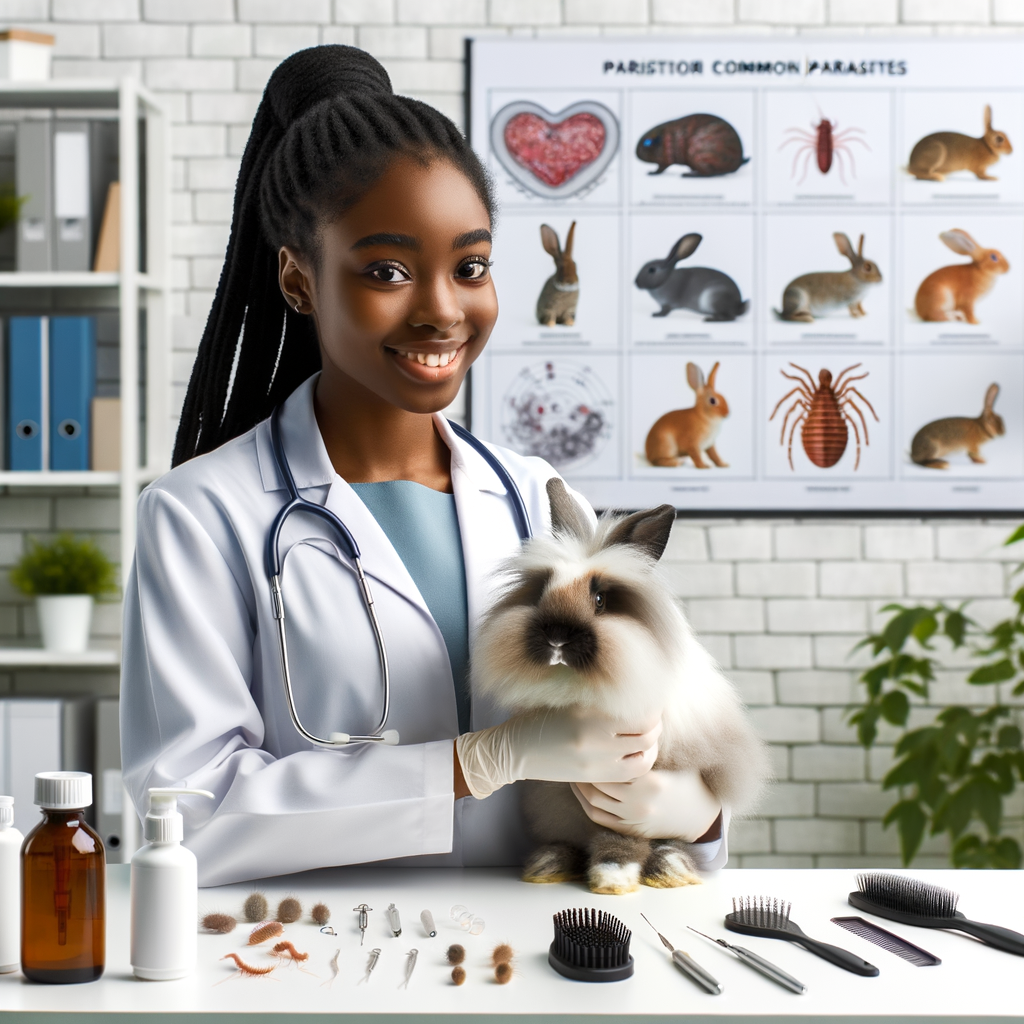
Introduction to Lionhead Rabbits
When it comes to pet rabbits, one breed stands out from the rest – the Lionhead Rabbit. This breed is not only unique in appearance but also in character. In this section, we will delve into the world of Lionhead Rabbits, exploring their characteristics, and emphasizing the importance of their health.
- Overview of Lionhead Rabbits
- Unique Characteristics of Lionhead Rabbits
- Importance of Lionhead Rabbit Health
The Lionhead Rabbit is a relatively new breed, recognized by the British Rabbit Council in 2002 and the American Rabbit Breeders Association in 2014. They are small, weighing between 2.5 to 3.75 pounds, and are known for their distinctive mane of fur around their head, resembling a lion’s mane, hence the name.
Lionhead Rabbits are not just known for their mane. They also have a high head mount, upright body type, short and well-furred ears, and a compact body. Their fur is medium in length and they come in a variety of colors. But what truly sets them apart is their personality. They are friendly, playful, and enjoy human company, making them great pets.
Like any pet, Lionhead Rabbits require proper care to ensure their health. They need a balanced diet, regular exercise, and routine vet check-ups. They are prone to certain health issues, such as dental problems and parasites, which we will discuss in later sections. Ensuring your Lionhead Rabbit’s health is not just important for their wellbeing, but also for their lifespan, which can be up to 10 years with proper care.
In the following sections, we will delve deeper into the health concerns of Lionhead Rabbits, including common parasites, prevention methods, and treatments. We will also provide tips on how to care for your Lionhead Rabbit to ensure they live a long, happy, and healthy life.
Common Parasites in Rabbits
As a rabbit owner, it’s important to understand the various health issues that can affect your pet. One common problem that rabbits face is parasites. These tiny creatures can cause a variety of health issues, ranging from mild discomfort to severe illness. In this section, we will delve into the world of rabbit parasites, their types, and their effects, particularly on Lionhead rabbits.
- Understanding Rabbit Parasites
- Types of Common Parasites in Rabbits
- Effects of Parasites on Lionhead Rabbits
Parasites are organisms that live on or in a host organism and get their food from or at the expense of their host. In rabbits, parasites can be external, like fleas and mites, or internal, like worms and protozoa. They can cause a range of symptoms, including itching, discomfort, weight loss, and in severe cases, can even be life-threatening.
There are several types of parasites that commonly affect rabbits. These include:
| Parasite | Description |
|---|---|
| Fleas | Small, wingless insects that feed on the blood of their host. They can cause itching and discomfort. |
| Mites | Microscopic creatures that can cause skin conditions like mange. |
| Worms | Internal parasites that live in the digestive tract. They can cause weight loss and other health issues. |
| Protozoa | Single-celled organisms that can cause diseases like coccidiosis. |
Lionhead rabbits, like other breeds, can be affected by parasites. The effects can vary depending on the type of parasite and the overall health of the rabbit. Common symptoms include itching, hair loss, weight loss, and changes in behavior. If you notice any of these symptoms in your Lionhead rabbit, it’s important to seek veterinary care as soon as possible.
In the next section, we will discuss how to prevent and treat these parasites to ensure your Lionhead rabbit stays healthy and happy.
Lionhead Rabbit Parasite Prevention
Parasites can be a significant threat to the health of your Lionhead rabbit. However, with the right preventive measures, you can keep your furry friend safe and healthy. Let’s explore some of the best practices for preventing rabbit parasites.
Preventing Rabbit Parasites: Best Practices
Preventing parasites in your Lionhead rabbit involves a combination of regular check-ups, proper hygiene, and a healthy diet. These steps are crucial in ensuring your rabbit remains parasite-free.
- Regular Check-ups
- Proper Hygiene
- Healthy Diet
Regular veterinary check-ups are essential for early detection and prevention of parasites. A vet can perform a thorough examination and provide necessary treatments to prevent infestations. According to a study, regular check-ups can reduce the risk of parasitic infections by up to 60%.
Keeping your rabbit and its environment clean is another effective way to prevent parasites. This includes regularly cleaning the rabbit’s cage, bedding, and food and water dishes. Remember, parasites thrive in dirty environments, so maintaining cleanliness can significantly reduce the risk.
A healthy diet is crucial for boosting your rabbit’s immune system, making it more resistant to parasites. Ensure your rabbit’s diet includes a balanced mix of hay, fresh vegetables, fruits, and high-quality rabbit pellets. A well-fed rabbit is a healthy rabbit.
In conclusion, parasite prevention in Lionhead rabbits is a vital part of their care. By following these best practices, you can ensure your rabbit stays healthy and happy.
Parasite Protocols for Rabbits
Parasite protocols are essential for maintaining the health of your Lionhead rabbit. These protocols involve understanding the process, implementing the necessary steps, and monitoring for effectiveness. Let’s delve into each of these aspects.
- Understanding Parasite Protocols
Parasite protocols are guidelines designed to prevent and treat parasite infestations in rabbits. They involve regular check-ups, maintaining hygiene, and providing a healthy diet. Understanding these protocols is the first step towards safeguarding your rabbit’s health. It’s important to know the common parasites that affect rabbits, their symptoms, and the preventive measures.
- Implementing Parasite Protocols
Once you understand the parasite protocols, the next step is implementation. This involves regular veterinary check-ups for your rabbit. During these check-ups, the vet will examine your rabbit for any signs of parasites. Hygiene is also crucial in preventing parasites. Ensure your rabbit’s living area is clean and free from feces. Lastly, a healthy diet is key. Providing your rabbit with a balanced diet can boost their immune system and help them fight off parasites.
- Monitoring for Effectiveness
After implementing the parasite protocols, it’s important to monitor your rabbit for any signs of improvement or worsening conditions. Regular monitoring helps in early detection of any potential issues and allows for timely treatment. If you notice any changes in your rabbit’s behavior, appetite, or physical appearance, it’s advisable to consult your vet immediately.
| Parasite Protocol Steps | Description |
|---|---|
| Understanding Parasite Protocols | Learn about common parasites, their symptoms, and preventive measures. |
| Implementing Parasite Protocols | Regular vet check-ups, maintaining hygiene, and providing a healthy diet. |
| Monitoring for Effectiveness | Observe your rabbit for any changes in behavior, appetite, or physical appearance. |
In conclusion, understanding, implementing, and monitoring parasite protocols are crucial steps in ensuring the health and well-being of your Lionhead rabbit. Remember, prevention is always better than cure.
Rabbit Parasite Treatment
When it comes to the health of your Lionhead rabbit, parasite treatment is a crucial aspect. Parasites can cause a variety of health issues in rabbits, but with the right treatment methods, they can be effectively managed. Let’s explore some of these methods.
Treating Parasites in Rabbits: Effective Methods
There are several ways to treat parasites in rabbits. The method chosen often depends on the type of parasite, the severity of the infection, and the overall health of the rabbit. Here are three common methods used:
- Medication: This is often the first line of defense against parasites. There are several types of medication available, each designed to target specific parasites. For example, Fenbendazole is commonly used to treat rabbits with pinworms. It’s important to note that medication should always be administered under the guidance of a vet.
- Veterinary Care: In severe cases, or when home treatments are not effective, professional veterinary care may be necessary. Vets have access to a wider range of treatments and can provide expert advice on managing parasites in rabbits. They can also monitor the rabbit’s health during treatment to ensure it is responding well.
- Home Remedies: Some rabbit owners prefer to use natural remedies to treat parasites. While these can be effective in some cases, they should be used with caution. Always consult with a vet before starting any home remedy to ensure it is safe for your rabbit.
Remember, the best way to deal with parasites is to prevent them in the first place. Regular check-ups, a clean living environment, and a balanced diet can all help keep your rabbit healthy and parasite-free.
Case Studies: Successful Parasite Treatment in Rabbits
Let’s delve into some real-life examples of successful parasite treatments in rabbits. These case studies will provide you with a better understanding of the process and its effectiveness.
- Case Study 1: Bella, the Lionhead Rabbit
- Case Study 2: Max, the Dwarf Rabbit
- Case Study 3: Daisy, the Lop Rabbit
Bella, a two-year-old Lionhead rabbit, was diagnosed with a common parasite, E. cuniculi. Her owner noticed a change in her behavior and took her to the vet. Bella was prescribed a course of oral medication, Fenbendazole, for 28 days. The treatment was successful, and Bella was back to her playful self within a month.
Max, a dwarf rabbit, was suffering from a severe case of ear mites. His owner noticed him constantly scratching his ears and shaking his head. The vet prescribed an ear drop treatment, Ivermectin, which was applied directly into Max’s ears for two weeks. Max’s condition improved significantly, and he was completely mite-free after the treatment.
Daisy, a lop rabbit, was diagnosed with a parasitic infection, Encephalitozoonosis. Daisy’s owner noticed her tilting her head and losing balance. The vet prescribed a combination of oral medications, Fenbendazole and Meloxicam. After a month of treatment, Daisy’s symptoms were completely gone, and she was back to her normal self.
These case studies highlight the importance of early detection and treatment of parasites in rabbits. Regular check-ups with the vet and attentive care can ensure your rabbit’s health and well-being.
Lionhead Rabbit Care
Caring for a Lionhead rabbit requires a good understanding of their unique needs. This section will guide you through the general care aspects, including feeding, grooming, and exercise.
General Care for Lionhead Rabbits
Like all pets, Lionhead rabbits need proper care to live a healthy and happy life. Here are the three main aspects to focus on:
- Feeding
- Grooming
- Exercise
Lionhead rabbits require a diet rich in hay, fresh vegetables, and a small amount of pellets. Hay should make up about 70% of their diet as it helps maintain their digestive health. Fresh vegetables like carrots, broccoli, and bell peppers can be given daily, while pellets should be limited to a small amount. Always ensure clean water is available.
Lionhead rabbits have a distinctive mane which requires regular grooming. Brush their fur at least once a week to prevent matting and hairballs. During shedding season, increase the frequency of brushing. Always be gentle to avoid hurting your rabbit.
Rabbits are active animals and need plenty of exercise to stay healthy. Provide your Lionhead rabbit with a safe space to run and hop around for at least a few hours each day. Toys can also help keep them active and mentally stimulated.
Remember, each Lionhead rabbit is unique and may have slightly different care needs. Always monitor your rabbit’s behavior and health, and consult with a vet if you notice any changes.
Summary Table
| Aspect | Details |
|---|---|
| Feeding | 70% hay, fresh vegetables daily, small amount of pellets, clean water always available |
| Grooming | Brush at least once a week, more frequently during shedding season |
| Exercise | Safe space for running and hopping, a few hours each day, toys for stimulation |
Proper care for your Lionhead rabbit can ensure they live a long, healthy, and happy life. Stay tuned for more specific care tips in the next section.
Special Care for Lionhead Rabbits
Lionhead rabbits are unique and require special care in certain areas. Let’s delve into the specifics of handling, health checks, and special needs for these adorable creatures.
- Handling
Handling a Lionhead rabbit requires a gentle touch. Their small size and delicate bone structure mean that rough handling can cause serious injuries. It’s important to support their hind legs when lifting them to prevent spinal damage. Always approach them calmly and slowly to avoid startling them. Remember, patience is key when handling these small creatures.
- Health Checks
Regular health checks are crucial for Lionhead rabbits. These checks should include a thorough examination of their teeth, ears, eyes, and fur. Dental problems are common in rabbits, so check their teeth weekly for overgrowth. Their ears should be clean and free from mites. A healthy rabbit’s eyes should be bright and clear. Regular grooming helps to keep their fur in good condition and allows you to check for any skin issues or parasites.
- Special Needs
Lionhead rabbits have a few special needs due to their unique fur. Their mane requires regular grooming to prevent matting and hairballs. They also need a diet high in fiber to support their digestive system. Additionally, they are prone to certain genetic conditions, so it’s essential to purchase your Lionhead from a reputable breeder who screens for these issues.
| Special Care Area | Key Points |
|---|---|
| Handling | Gentle, supportive, calm approach |
| Health Checks | Regular checks for teeth, ears, eyes, and fur |
| Special Needs | Regular grooming, high fiber diet, genetic screening |
In conclusion, Lionhead rabbits are wonderful pets, but they do require some special care. By understanding their needs and providing appropriate care, you can ensure a happy and healthy life for your furry friend.
Lionhead Rabbit Diseases
Just like any other pet, Lionhead rabbits can also suffer from various diseases. It’s important for owners to be aware of these diseases, how to prevent them, and how to treat them if they occur. Let’s explore some of the common diseases in Lionhead rabbits, how to prevent them, and what to do if your rabbit gets sick.
- Common Diseases in Lionhead Rabbits
- Snuffles: This is a respiratory disease caused by bacteria. Symptoms include sneezing, runny nose, and watery eyes.
- Ear Mites: These tiny parasites can cause itching, redness, and discomfort in your rabbit’s ears.
- Overgrown Teeth: Rabbits’ teeth grow continuously. If they don’t wear down properly, they can become overgrown and cause pain and difficulty eating.
- Preventing Diseases in Lionhead Rabbits
- Regular Check-ups: Regular vet check-ups can help detect any potential health issues early.
- Proper Diet: A balanced diet can help keep your rabbit healthy and prevent diseases.
- Clean Environment: Keeping your rabbit’s living area clean can prevent the spread of bacteria and parasites.
- Treating Diseases in Lionhead Rabbits
- Antibiotics: For bacterial infections like snuffles, your vet may prescribe antibiotics.
- Parasite Treatment: If your rabbit has ear mites, your vet can provide a treatment to kill the mites.
- Dental Care: For overgrown teeth, your vet can trim the teeth to a more comfortable length.
Lionhead rabbits are prone to several common diseases. These include:
Prevention is always better than cure. Here are some ways to prevent diseases in your Lionhead rabbit:
If your rabbit does get sick, it’s important to seek veterinary care as soon as possible. Here are some common treatments for the diseases mentioned above:
In conclusion, while Lionhead rabbits can suffer from various diseases, with proper care and attention, you can keep your furry friend healthy and happy.
Conclusion: Protecting Your Lionhead Rabbit
In conclusion, keeping your Lionhead rabbit healthy and free from parasites is a responsibility that requires dedication and knowledge. Let’s summarize the key points we’ve discussed in this article.
- Key Takeaways
- Importance of Regular Vet Visits
- Commitment to Lionhead Rabbit Health
Understanding the common parasites that affect rabbits and how to prevent them is crucial. Regular grooming and cleaning of your rabbit’s habitat can help prevent the spread of parasites. If your rabbit does contract a parasite, prompt treatment is essential to prevent further health complications.
Regular vet visits are not just for when your rabbit is sick. Routine check-ups can help detect potential health issues before they become serious. Your vet can also provide valuable advice on diet, exercise, and other aspects of rabbit care.
As a Lionhead rabbit owner, your commitment to your pet’s health should be a top priority. This includes providing a balanced diet, ensuring regular exercise, and maintaining a clean living environment. Remember, a healthy rabbit is a happy rabbit!
With the right knowledge and commitment, you can ensure your Lionhead rabbit lives a long, healthy, and happy life. Thank you for taking the time to learn about the importance of protecting your Lionhead rabbit from parasites and diseases. Your furry friend is counting on you!




